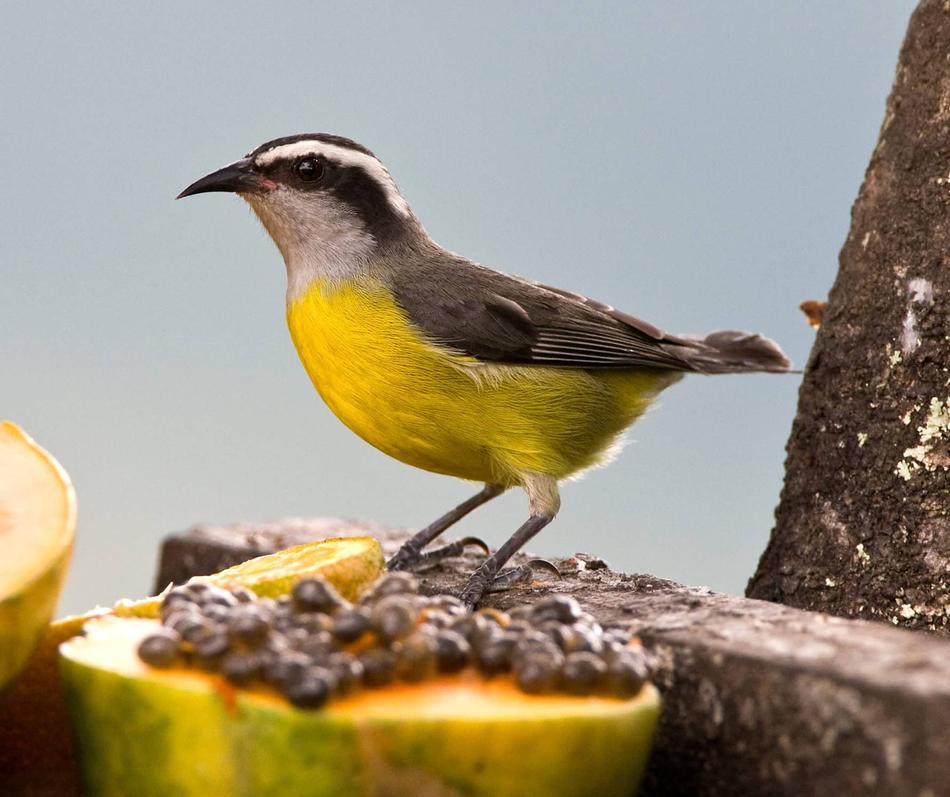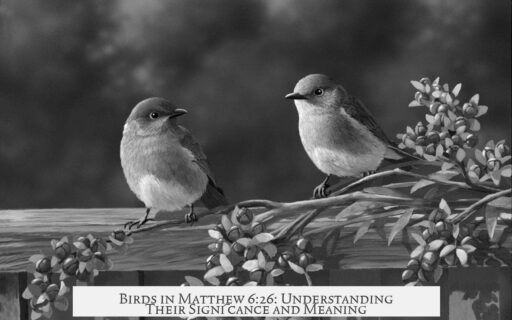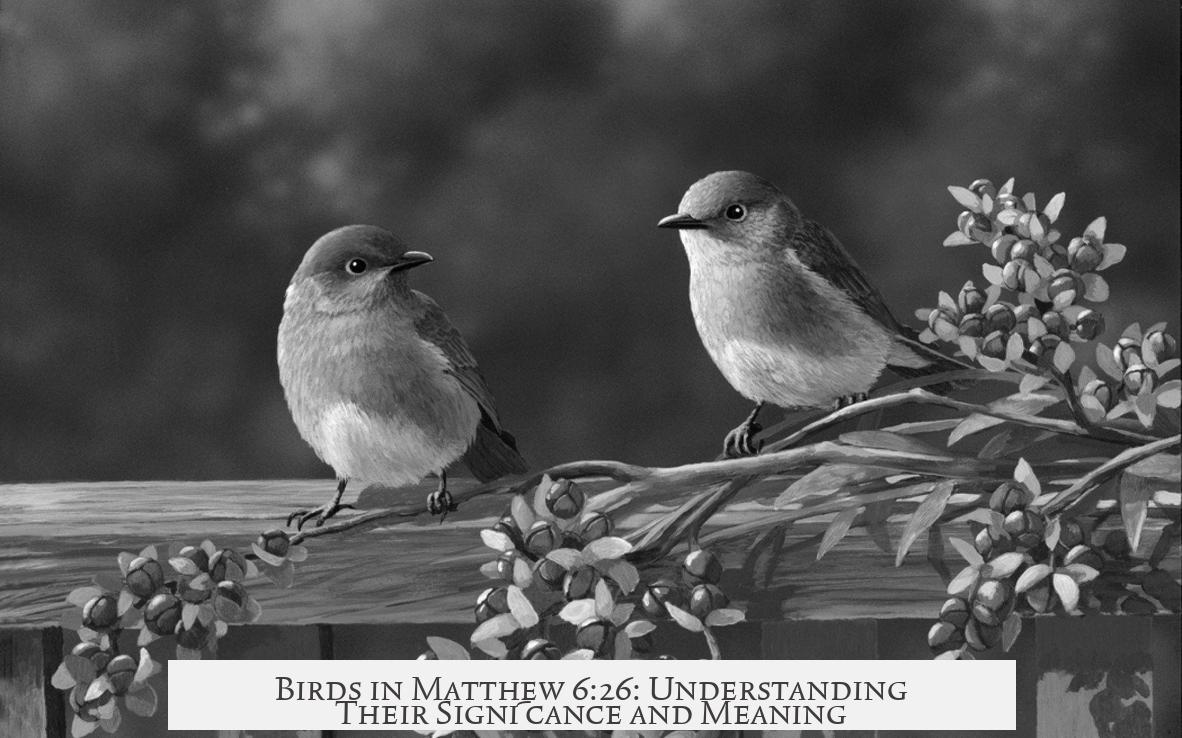Matthew 6:26 is referring broadly to the wild birds of the sky, primarily those that do not sow, reap, or store food in barns, using their natural behavior as an example of reliance on God’s provision.

The verse states: “Look at the birds of the sky, that they do not sow, nor reap, nor gather into barns, and yet your heavenly Father feeds them. Are you not much more important than they?” This passage does not target any specific bird species. Instead, it highlights birds generally, focusing on their lack of agricultural practices common among humans.
Birds known to Jesus’ audience mainly included those common in ancient Judea, a semi-arid region with many migratory and local species. The mention of birds not sowing or reaping points toward creatures like migratory birds, which were abundant and visible in the region. Migratory birds crossing through the Black Sea–Mediterranean Flyway—an important bird migration route through Europe and Asia to Africa—are a likely reference. Many such birds pass through the Mediterranean in seasonal patterns, including species like the barn swallow. These birds neither farm nor store grain but survive on what they find.

Jesus’ listeners were mainly rural peasants familiar with local wildlife. They would know from observation that birds do not engage in the deliberate farming activities associated with human survival, like sowing seeds or gathering and storing crops in granaries or barns (Greek: ἀποθήκη, “apotheke”). While some birds, such as crows or ravens, display caching behavior—storing food in hidden spots—this was not typical for most birds and certainly did not align with human-style grain storage in barns.
The significance lies in contrasting human efforts to secure food with the birds’ apparent carefreeness. Birds do not farm or store yet receive sustenance through natural means, which Jesus attributes to God’s providence. This message encourages trust in divine provision rather than anxiety over material needs.

The teaching fits into a broader theological and cultural context. Food scarcity and hunger were common concerns in ancient Judea. Food storage and farming were essential for survival. By highlighting birds’ reliance on God for sustenance, Jesus addresses common fears about livelihood and security.
This passage also connects to other teachings of Jesus, such as in Matthew 12:1-8, where he defends his disciples for eating grain on the Sabbath. Both passages emphasize trust in God’s care over legalistic worry about provision.

| Aspect | Details |
|---|---|
| Birds referenced | General wild birds in ancient Judea, likely including migratory species like barn swallows |
| Behavior focused | Do not sow, reap, or store food in barns |
| Human vs bird behavior | Humans store crops; birds rely on natural provision without farming or storing grain |
| Audience context | Rural peasants familiar with local bird behavior and agricultural practices |
| Theological point | God provides for creatures without anxiety; humans should trust God similarly |
Jesus uses the example of birds to teach a spiritual truth. The birds’ dependence on God’s provision without human farming efforts illustrates faith. Birds, including migratory species, serve as a vivid and relatable example for his audience experiencing insecurity.
The teaching remains clear despite some birds occasionally storing food in small amounts. Such behaviors were exceptions and did not undermine the general observation that birds do not practice organized farming or food storage comparable to humans.

- Birds in Matthew 6:26 refer to wild, mainly migratory and local birds in ancient Judea.
- These birds neither sow, reap, nor store food, unlike humans.
- The example illustrates God’s provision and encourages trust without worry about material needs.
- The audience understood these birds’ behavior from everyday life, making the teaching practical and relatable.
- Minor food-caching behaviors in some birds do not change the broader spiritual point of the verse.
What Birds Is Matthew 6:26 Talking About? A Look Beyond the Surface
Matthew 6:26 talks about the common birds of the sky — the kind that neither sow, reap, nor store food in barns — to illustrate a powerful point about trusting God’s provision. But what kind of birds are these? Were they sparrows? Swallows? Crows? Let’s unpack this fascinating question with a blend of biblical insight, natural history, and a sprinkle of humor.

If you’ve ever wondered exactly which birds Jesus meant in that famous passage, you’re not alone. Let’s start by looking at the passage itself. Jesus says:
“Look at the birds of the sky, that they do not sow, nor reap, nor gather (crops) into barns, and yet your heavenly Father feeds them. Are you not much more important than they?”
The Birds Jesus Talks About: General, Not Specific
First off, Jesus doesn’t name particular species like a birdwatcher identifying species with a fancy guidebook. Instead, He speaks broadly about “birds of the sky.” This indicates He refers to birds as a general category recognized by His audience naturally watching daily life.
Jesus contrasts bird behavior with human farming. People till soil, plant seeds, harvest crops, and store surplus in barns — the word apotheke in Greek, literally a repository or granary. Birds, according to Jesus, do none of these things. They get by without human-like efforts or anxiety about food storage.
Sounds simple, right? But were there really no birds that stored food around? Well… some birds like crows and ravens’ll sneak tricky food caches, storing snacks for winter like tiny avian squirrels. Yet, this isn’t typical bird behavior, especially among birds familiar to Jesus’ audience. Migratory birds, for example, don’t store at all — they move with the seasons, trusting food will be available along the route.
Migratory Birds: The Likeliest Candidates
The setting is ancient Judea, near the Mediterranean— a bird migration hotspot. Thousands of birds travel the Black Sea–Mediterranean Flyway yearly from northern Europe and Asia down south. It’s a bird superhighway crossing areas Jesus’ listeners would know well.
Take for instance the barn swallow. They don’t store food and ironically sometimes annoy local farmers by nesting on barns (talk about freeloaders!). They fly vast distances, feeding on insects found en route, never worrying about “stocking up.”
This migratory lifestyle fits perfectly with Jesus’ point: birds don’t prepare food for a rainy day with barns and granaries. They simply live day-to-day, trusting provision. Their behavior would resonate with Jesus’ crowd familiar with these seasonal flyers.
What Does This Mean for Us?
Here’s where it gets deep. Jesus uses birds not to give an ornithology lesson but to teach about trust, worry, and faith. His audience — mostly agrarian people living close to the land — knew the hard work, risks, and anxieties surrounding farming and harvest.
Those peasants watched birds soar overhead, scavenge food, and survive without any sign of “sowing seed.” Jesus invites them to consider: if God cares so kindly for creatures that don’t work or store food like humans, how much more will He care for His people?
It’s a call to drop anxiety about material needs, not a critique against bird intelligence or industriousness. Birds, in essence, become the everyday example of divine providence and care.
Everyday Bird Knowledge in Ancient Times
Romans and Jews in that era were keen observers of nature. Their understanding stemmed from long-term, practical experience, not modern science. They saw birds feeding freely from the wild, not hoarding granaries. Even if certain birds cached food, that wasn’t the norm.
Jesus’ comparison draws on this communal knowledge, making the teaching vivid and memorable. He summons familiar sights in nature to make a spiritual truth accessible: trust God. It’s a lesson well suited to those facing the uncertainties of ancient agricultural life, where famine and hunger were real threats.
Some Surprising Bird Facts That Fit the Picture
- Crows and ravens do hide food, but it’s a clever exception, not the rule.
- Migratory birds like swallows, warblers, and storks rely on the abundance encountered during migration rather than stored stores.
- Most wild birds forage daily without any long-term food storage, perfectly illustrating Jesus’ message.
What Can We Learn? Practical Takeaways
Next time anxiety about future needs strikes, picture those carefree swallows darting across the sky. No food stash. No panic. Yet they eat and thrive.
This imagery reminds us to focus on the essentials of trust rather than obsess over material security. Like those birds, we can invite a sense of peace around provision.
Would life feel lighter if more of us embraced this mindset? Probably. Spiritual teaching turned practical: watch the birds and let go of worry.
Why Not Place a Bet on Divine Care?
Despite the worries of ancient and modern times, Matthew 6:26 challenges us to believe in a higher provision. Jesus’ original audience would nod knowingly at the birds’ carefree habits, and so can we today.
In sum, the birds in Matthew 6:26 are general wild and migratory birds, seen daily by ancient Judean farmers—birds that do not plant, harvest, or store food but are nonetheless fed. Their example points to God’s ongoing care and urges us toward trust.
So next time you spot a barn swallow or hear a crow’s caw, remember: these little creatures tell a much bigger story—one about trust, provision, and living free from anxious toil.
Summary Table: Key Points About Birds in Matthew 6:26
| Topic | Details |
|---|---|
| Bird Category | General birds of the sky, not specific species |
| Behavior Compared | Birds don’t sow, reap, or store in barns; humans do |
| Common Examples | Migratory birds like barn swallows, warblers; crows that cache food are exceptions |
| Audience Knowledge | Roman-era peasants knew bird habits from daily observation |
| Theological Lesson | God provides for birds without worry; humans should trust God likewise |
| Context | Ancient fear of hunger; teaching on trust and provision (cf. Matthew 12:1-8) |
Want to dig deeper? Check out the Black Sea–Mediterranean Flyway here or read this study on Mediterranean bird migration. Nature has a lot to teach when we pause to look.
So, what’s your take? Do birds offer a more reliable life lesson than your average financial planner? Maybe the birds have a secret to a worry-free life. Start looking up — and maybe start trusting a bit more.




